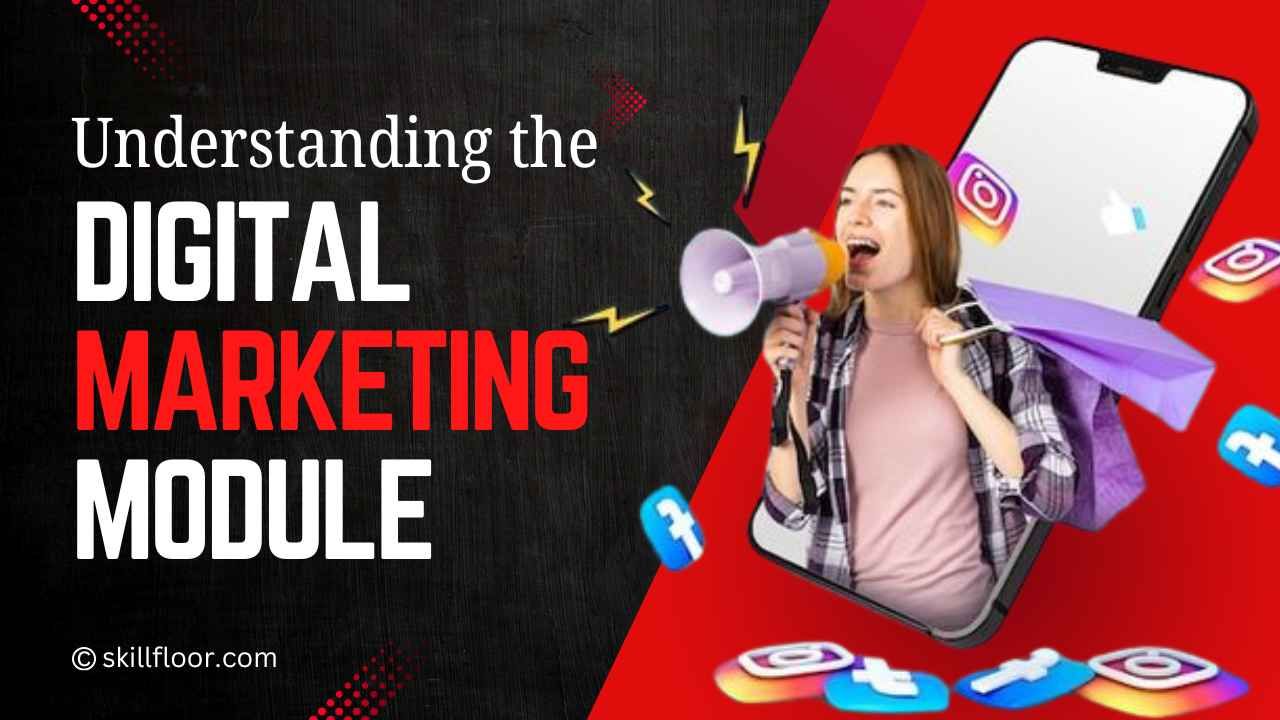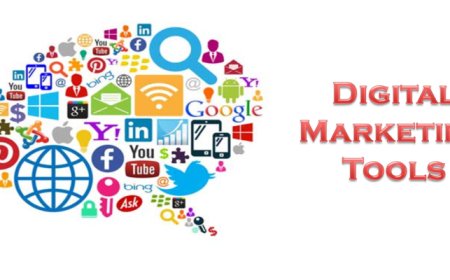Understanding the Digital Marketing Module
Learn key digital marketing strategies like SEO, content, PPC, and social media. Gain practical skills to boost your career or business with a digital marketing module.

As a digital marketing expert, I can tell you that businesses today need skilled marketers more than ever. Digital marketing touches everything from social media to search engines, and staying competitive requires knowing how to create strong online campaigns. A digital marketing module helps students by giving them a clear path to learn the right strategies, tools, and platforms they’ll need to succeed. It’s all about making sure you have the practical abilities to comfortably go through a digital environment.
Let’s break it down in simple terms:
What is Digital Marketing?
Digital marketing is the promotion of products or services using online platforms like social media, email, websites, and search engines. The goal is to reach the right people at the right time to get them interested in what a business offers. In today's world, it's more important than ever because people spend so much time online.
Why Learn Digital Marketing?
Whether you're a student, business owner, or someone wanting to build a career in marketing, understanding digital marketing is a must. It gives you practical skills to promote brands, grow customer bases, and even analyze data to see what works and what doesn’t. Many businesses are looking for people with these skills, so it’s also great for job opportunities.
Overcoming the Complexity of Digital Marketing
The biggest challenge for beginners in digital marketing is navigating the many tools and strategies. It’s hard to know where to start and how everything fits together. Common struggles include:
-
Understanding Basics: Many skip foundational concepts like how search engines work.
-
Choosing Platforms: Deciding which platforms (e.g., Facebook, Google) to focus on is tricky.
-
Measuring Success: There’s lots of data, but making sense of it requires training.
-
Keeping Up with Changes: Digital marketing rules change often, making it tough to stay updated.
A structured learning module helps simplify these complexities by breaking them down into manageable parts.
What a Digital Marketing Module Teaches
You’re probably wondering, “What exactly does a digital marketing module cover?” Let me walk you through some of the most important sections.
1. SEO (Search Engine Optimization)
SEO is all about making sure your content ranks high in search engines like Google. You’ll learn how search engines work and how to optimize content so that it appears at the top of search results. This involves keyword research, on-page SEO (like optimizing titles and meta descriptions), off-page SEO (like building backlinks), and technical SEO (like site speed and mobile optimization).
The goal is to drive organic (unpaid) traffic to your site, which is highly valuable in the long term.
Content is king in digital marketing. In this section, you’ll learn how to create content that not only attracts visitors but also engages them and encourages them to take action. This might include blog posts, videos, infographics, and social media content. Content marketing is closely tied to SEO, as well-crafted content helps improve your search rankings.
A good module will also teach you about content distribution strategies—how to get your content in front of the right audience using platforms like social media, email, and influencer marketing.
Social media platforms like Facebook, Instagram, LinkedIn, and Twitter offer businesses a way to directly engage with their customers. In this module, you’ll learn how to use these platforms to build a brand, increase followers, and promote products or services.
This section often covers both organic social media (unpaid efforts) and paid social media advertising (using platforms like Facebook Ads or LinkedIn Ads to reach a larger audience).
4. Email Marketing
Despite being one of the older digital marketing strategies, email marketing is still incredibly effective. You’ll learn how to build an email list, segment your audience, create compelling email content, and measure success through metrics like open rates and click-through rates.
Email marketing is especially valuable for nurturing relationships with potential customers and encouraging repeat business from existing ones.
5. Pay-Per-Click (PPC) Advertising
PPC allows businesses to show ads to people who are searching for specific keywords. With platforms like Google Ads, businesses only pay when someone clicks on their ad. In this section, you’ll learn how to create and manage PPC campaigns, how to bid for ad placements, and how to optimize your ads for maximum ROI (Return on Investment).
6. Web Analytics
One of the advantages of digital marketing is that almost everything can be measured. In this section, you’ll learn how to use tools like Google Analytics to track website visitors, understand their behavior, and measure the effectiveness of your campaigns. Knowing how to interpret data is crucial for improving future strategies.

How Digital Marketing Tools Help
One thing I love about digital marketing modules is the hands-on approach. A good module won’t just teach you theory—it will give you opportunities to practice what you’ve learned. For instance, you might be asked to create a real SEO strategy, run a social media campaign, or even set up a small-scale PPC ad.
Many modules include access to industry-standard tools, such as:
-
Google Analytics: To track and analyze website data.
-
SEMrush: For keyword research and competitor analysis.
-
Hootsuite: To schedule and manage social media posts across different platforms.
By getting familiar with these tools during the course, you’ll gain practical experience that’s immediately applicable in real-world scenarios.
Who Should Take a Digital Marketing Course?
A digital marketing course module isn’t just for marketing students. It’s a valuable resource for:
-
Business Owners: Who wants to manage their marketing or understand what their marketing team is doing?
-
Aspiring Digital Marketers: Looking to break into the field and build a solid foundation of skills.
-
Freelancers: Who wants to offer digital marketing as a service to clients?
-
Marketing Professionals: Those who need to update their skills or specialize in certain areas like SEO, social media, or PPC.
Even if you’re not planning on becoming a digital marketing expert, understanding the basics can give you an edge in nearly any business role. Whether you’re in sales, product development, or customer service, knowing how to reach customers online is a powerful skill.
Real-World Practice
A good digital marketing module doesn’t just teach theory. It also gives you practical tasks, like creating your marketing campaigns or running real ads. This hands-on experience is invaluable and can be added to your portfolio to showcase to future employers.
Certification and Career Boost
Many digital marketing modules offer certification at the end of the course. This certificate can be added to your resume or LinkedIn profile to show employers that you have the skills they’re looking for. It can also lead to various job roles such as:
-
SEO Specialist
-
Content Creator
-
Social Media Manager
-
Digital Marketing Analyst
Trends to Watch for the Future
Digital marketing is always changing, and staying on top of the latest trends is important. Many digital marketing modules also introduce you to emerging trends, such as:
-
Artificial Intelligence (AI): Tools that use AI to automate repetitive tasks, analyze data, and even personalize marketing messages for customers.
-
Voice Search: More people are using voice assistants like Siri or Alexa to search for information. This means marketers will need to adapt their SEO strategies to cater to voice-based queries.
-
Video Marketing: Video content continues to grow, with platforms like YouTube, Instagram, and TikTok dominating. Understanding how to create engaging video content is a must.
Learning about these trends helps you stay ahead of the curve and ensures your skills remain relevant in a fast-growing industry.
How a Digital Marketing Module Can Boost Your Career
The digital marketing module provides everything you need to get started or advance in digital marketing. From understanding SEO to running paid ad campaigns, you’ll walk away with a full toolkit of skills that are in high demand by employers and businesses.
You’ll also earn certifications that demonstrate your proficiency, making it easier to find a job or gain credibility as a freelancer. Employers love to see that you not only understand the concepts but can apply them effectively.
Invest in Your Future with a Digital Marketing Module
Digital marketing is no longer just an option for businesses—it’s essential. Whether you’re looking to advance your career, grow a business, or simply understand how the online world works, a digital marketing module is the perfect way to build your knowledge.
By taking a structured course, you’ll learn how to master the key areas of digital marketing, from SEO and content creation to analytics and social media strategy. You’ll also gain practical experience using industry-standard tools, which is crucial for landing a job or running effective marketing campaigns.
So, if you’re ready to step into the world of digital marketing, consider enrolling in a Digital Marketing Module. It’s an investment in your future that will pay off in more ways than one.






























































